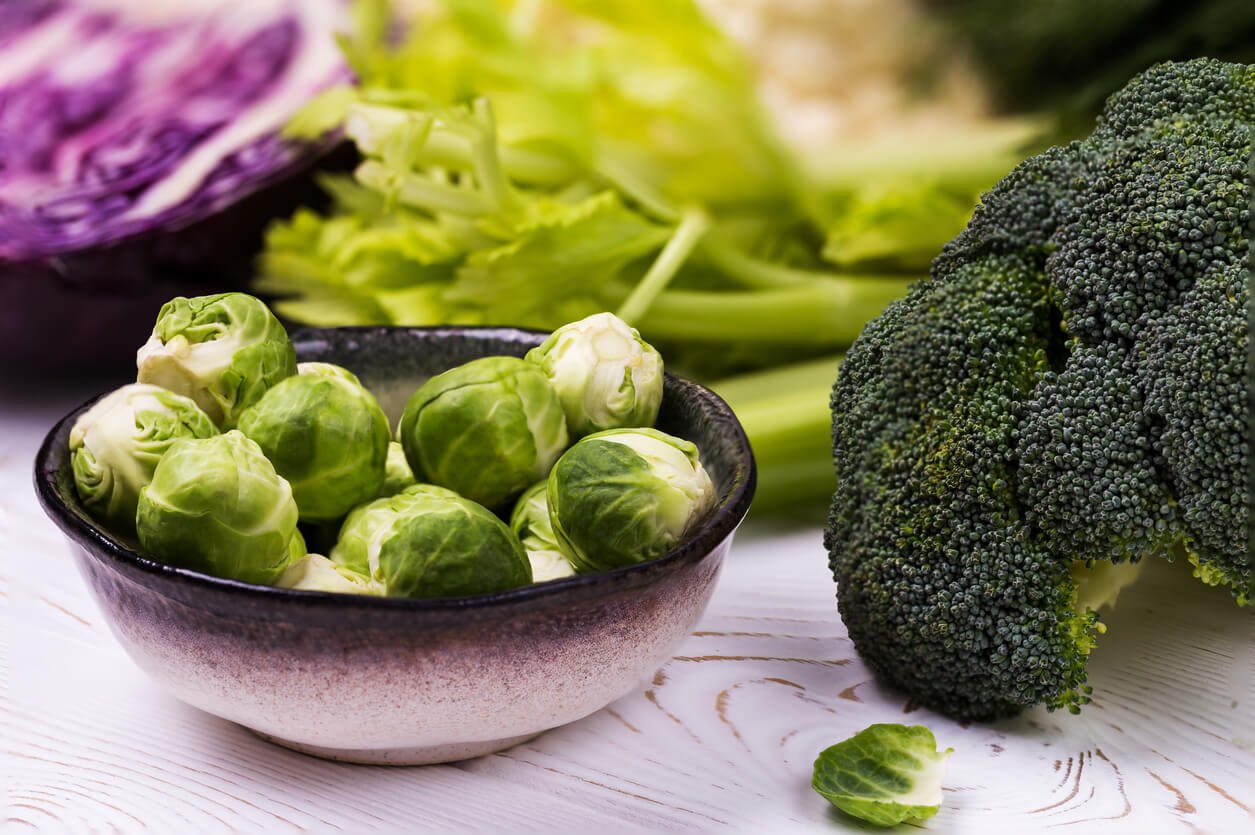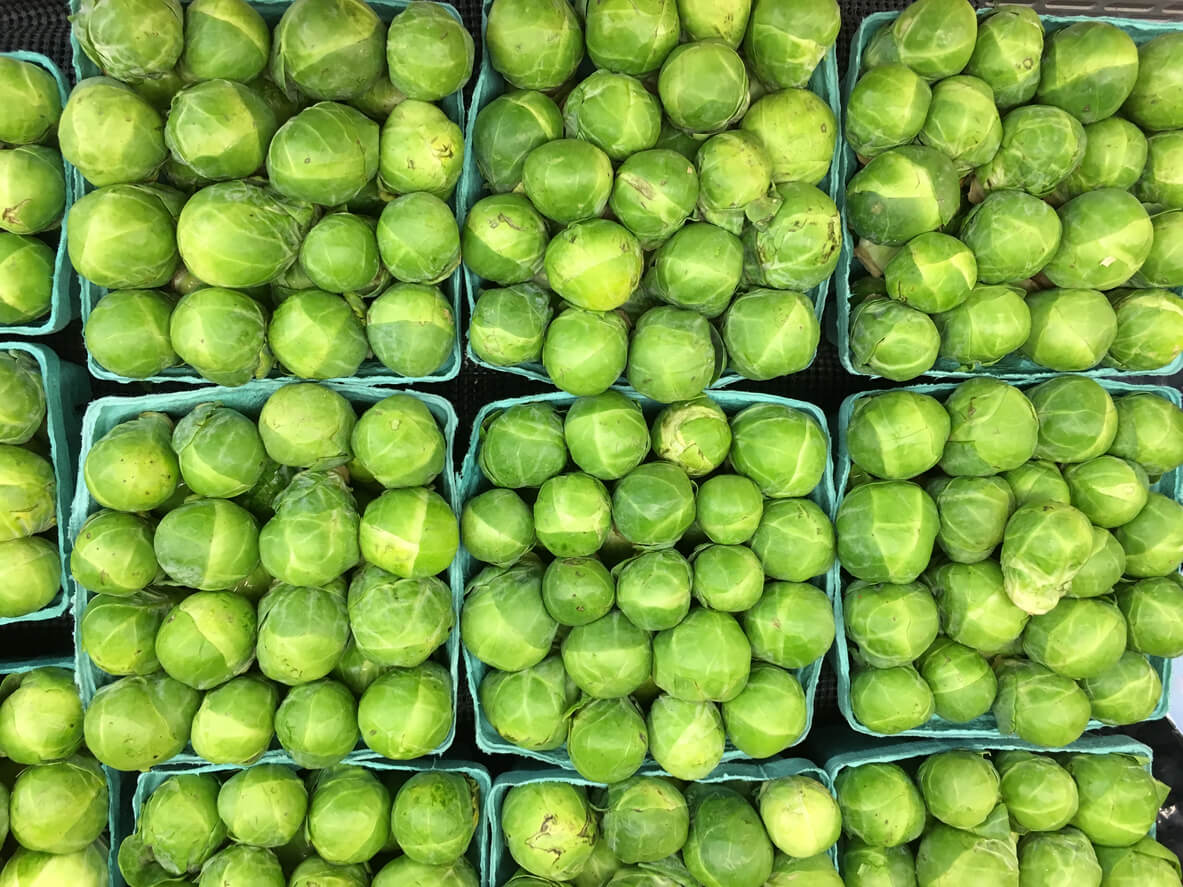Let’s face it, Brussels sprouts are divisive little veggies. If you’ve tried them, you
probably either love them or hate them already. If you’re new to Brussels sprouts, you may be hesitant because of the bad press you’ve run into. Their reputation may not have much to do with their flavor (let alone their nutritional properties), but may be mostly based on their strong odor when cooked, or possibly the fact that they’re often served as over-boiled mush.But, like Capra’s classic tale of redemption, Brussels sprouts have made a big comeback. These days they’re lighting up the culinary world, with oodles of online recipes and demos showing us how to get them just right. For previous generations who grew up exposed to mushy, smelly Brussels sprouts, this particular redemption tale must seem particularly miraculous.
If you’re in the “don’t like them” or “haven’t really tried them” group, we hope to change your mind and help you become a raving fan! If you’re already a Brussels sprouts buff, we aim to load you up with persuasive info and delicious recipes to sway the naysayers in your life. In this article, we’ll look at the nutrition and health benefits Brussels sprouts have to offer, discuss a few potential downsides, and explore the many ways you can prepare and use them to create delicious meals.
Are Brussels Sprouts Really From Brussels?
Brussels sprouts don’t grow in the wild and aren’t native to the United States, so where did they come from?
Unlike french fries, Moscow Mules, and Spanish flu, Brussels sprouts did in fact originate somewhere in the vicinity of the region that bears their name. Brussels sprouts have been grown in Belgium since the 13th century, and, starting in the 16th century, spread from there to other countries in Europe. The French did the PR work, coining the name for the tiny cabbage-looking and -tasting veggies.
In addition to naming the vegetable, the French also introduced Brussels sprouts to Louisiana in 1800, from where they spread throughout the US.
Today, we know Brussels sprouts as spherical little green veggies — almost like miniature heads of cabbage — that grow in groups on a thick stalk. You can generally purchase them (still on the stalk, or removed and loose or in a bag) from many stores and farmers’ markets.
Interestingly, Brussels sprouts and other cruciferous veggies — including broccoli, cauliflower, cabbage, kale, bok choy, arugula, collards, watercress, radishes, kohlrabi, and mustard greens — are actually all the same species: Brassica Oleracea, of the mustard plant family. Botanists and growers have bred this primordial brassica into dozens of different varieties over hundreds of years. It’s the lateral leaf buds of this plant that became what we know as the Brussels sprouts cultivar.
Brussels Sprouts Nutrition

Brussels sprouts may be tiny, but they’re big on nutrition. These little veggies are high in potassium, vitamin C, vitamin B6, folate, vitamin A, and vitamin K1. They’re also a good source of iron, magnesium, phosphorus, and calcium. What’s more, in one cup of Brussels sprouts you’ll find only 38 calories, but a solid 3 grams of protein and 3.5 grams of fiber.
They also contain compounds called glucosinolates. These are potent precursors to the powerful antioxidant sulforaphane, which are in broccoli and other Brassica vegetables, too. Sulforaphane is an extraordinary nutrient with uniquely powerful anti-inflammatory, neuroprotective, anticancer, and antimicrobial properties.
Cruciferous vegetables, in general, are good sources of phenolic compounds, flavonoids, and carotenoids. These are all science-y terms for potent compounds found in plant foods, all of which offer a bunch of health benefits.
The way you cook your Brussels sprouts appears to influence how much of these nutrients you’ll actually get. Studies have found that boiling reduces the level of phenolic compounds and other antioxidants the most (yet another reason to reject the “boil until they’re the consistency of applesauce” technique you may have grown up with).
Benefits of Brussels Sprouts

Many of the health benefits that Brussels sprouts have to offer are thanks to the powerful plant compounds they contain. Below are some of the health-related reasons that you may want to consider adding them to your diet.
1. They may help reduce your risk of heart disease.
Brussels sprouts are rich in fiber, a nutrient known to benefit your heart health by lowering high LDL cholesterol levels and preventing plaque build-up that can lead to a heart attack or stroke.
As members of the cruciferous vegetable family, they may also benefit your circulatory system. In fact, a diet high in cruciferous vegetables has been found to be inversely associated with the thickness of the carotid artery, which has to do with how much plaque build-up there is (and therefore with the risk of heart disease).
One 2021 study published in the British Journal of Nutrition provided a food frequency questionnaire to 684 older women in order to see if there was a relationship between cruciferous vegetable intake and calcification in the abdominal aorta (the end of the largest blood vessel that carries blood away from the heart).
After adjusting for other lifestyle, dietary, and heart disease risk factors, the researchers found that the women who had the highest intake (at least 44 grams per day) of cruciferous vegetables — including Brussels sprouts, cabbage, cauliflower, and broccoli — had a 46% lower risk of extensive calcification in the abdominal aorta. Remarkably, this positive association was not observed for total vegetable intake, strengthening the case for eating more cruciferous veggies in particular to improve heart health outcomes.
2. They may offer anticancer benefits.
Sulforaphane is known to have strong anticancer properties. While the mechanisms of action are still being researched, one hypothesis is that sulforaphane actually inhibits specific enzymes that are involved in activating cancer cells. Eating Brussels sprouts is a great way to get this compound into your body.
A 2002 study published in the journal Food and Chemical Toxicology looked at the effects of Brussels sprout juice on damaged DNA in human liver cells within a test tube setting. The authors found that Brussels sprout juice was highly protective against DNA damage and offered chemoprotective benefits. (Hollywood studio moguls reading this, here’s a pitch: Jeff Goldblum eats Brussels sprouts before getting into the teleportation machine with that fly and comes out totally unchanged. On second thought, maybe not.)
3. They may support healthy weight loss.
Research suggests that isothiocyanate compounds in Brussels sprouts target fat cells and could help reduce obesity. In a 2018 animal study, researchers found that when these compounds were fed to mice on a high-fat diet, they helped reduce body weight, accumulation of fat droplets in the liver, and fat cell size. (For reference, our view on the use of animals in medical research is here.)
In another animal study using high-fat-, high-sucrose-fed obese mice (in this case, ethically questionable animal testing meant feeding mice like many humans feed themselves), researchers examined the relationship between sulforaphane and leptin responsiveness. Leptin is a “hunger hormone” that tells us to reduce food intake and increase energy expenditure, preventing weight gain. In the study, the authors found that treatment with sulforaphane along with a leptin injection resulted in significant decreases in food intake and weight gain. Overall, they concluded that sulforaphane may help improve leptin responsiveness in diet-induced obesity.
4. They may help protect your brain.
The compounds in Brussels sprouts also appear to protect against central nervous system diseases by activating what’s called the “nuclear factor erythroid 2-related factor pathway” (you need a pretty sharp brain just to read that), which is involved in activating brain-protective enzymes. Furthermore, sulforaphane appears to act on other pathways that boost the longevity of brain cells and help prevent neurodegeneration.
Brussels sprouts contain compounds that help protect against oxidative stress-induced damage in the brain. Specifically, a connection exists between the accumulation of amyloid-beta in the brain and the progression of neurodegenerative disease processes like Alzheimer’s dementia. A 2013 study conducted on mice found that the antioxidant kaempferol — extracted from Brussels sprouts — helped to protect the brains of the mice against the buildup of amyloid beta toxicity.
5. They may have anti-inflammatory benefits.
It’s not surprising that with all of these other disease-fighting properties, Brussels sprouts may also offer benefits when it comes to inflammation in the body (which is often an underlying factor in many chronic diseases). For example, isothiocyanate from cruciferous vegetables can suppress the expression of inflammatory markers in mammals and can downregulate inflammation in test tube studies.
In a 2015 study published in the Journal of the Academy of Nutrition and Dietetics, researchers evaluated the association of vegetable intake with inflammatory and oxidative stress markers among 1,005 Chinese women. The authors found that a higher intake of cruciferous vegetables — including Brussels sprouts — was associated with lower circulating levels of inflammatory markers in the women’s blood.






Комментариев нет:
Отправить комментарий